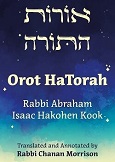
We begin the morning prayers by recalling the psalmist’s ebullient directive to sing out our gratitude and wonder:
שִׁירוּ-לוֹ, זַמְּרוּ-לוֹ, שִׂיחוּ בְּכָל-נִפְלְאוֹתָיו. (תהילים ק"ה:ב)
“Sing (shiru) to Him, play music (zamru) to Him, speak (sichu) of all His wonders.” (Psalms 105:2)
What is the difference between these three forms of human expression: Shirah, Zimrah, and Sichah?
Three Stages to Process Our Wonder
Rav Kook explained that we process our awareness and wonder of God’s providence in three stages.
The first stage is Shirah. This is an initial flash of insight, a spark of poetic inspiration. The thought is not yet fully defined and developed; but it is the result of a clear vision, a pure and lofty insight.
Next comes Zimrah. This is music, a lyric expression of our inner emotions. Our sense of awe and wonder touches the heartstrings of the soul. We are moved and filled with feelings of gratitude; and the heart responds with joyful song.
Finally comes the third stage: Sichah. The word sichah means ‘talk’ or ‘conversation.’ This is an introspective discourse, as we contemplate God’s sublime light and reflect deeply on the wonders of His creation.
After the inner flash of insight of shirah and the heartfelt song of zimrah, comes the contemplative discourse of sichah. Compared to the first two steps, sichah is like a composition of prose, well-developed and thought out. It expands upon the original insight, as we examine life and the world around us.
“Speak of all His wonders.” Profound and numerous insights are revealed to those who contemplate the wonders of the Creator with Perfect Knowledge.
(Adapted from Olat Re’iyah vol. I, p. 200)
Illustration image: ‘King David Playing the Harp’ (Gerard van Honthorst, 1622)





